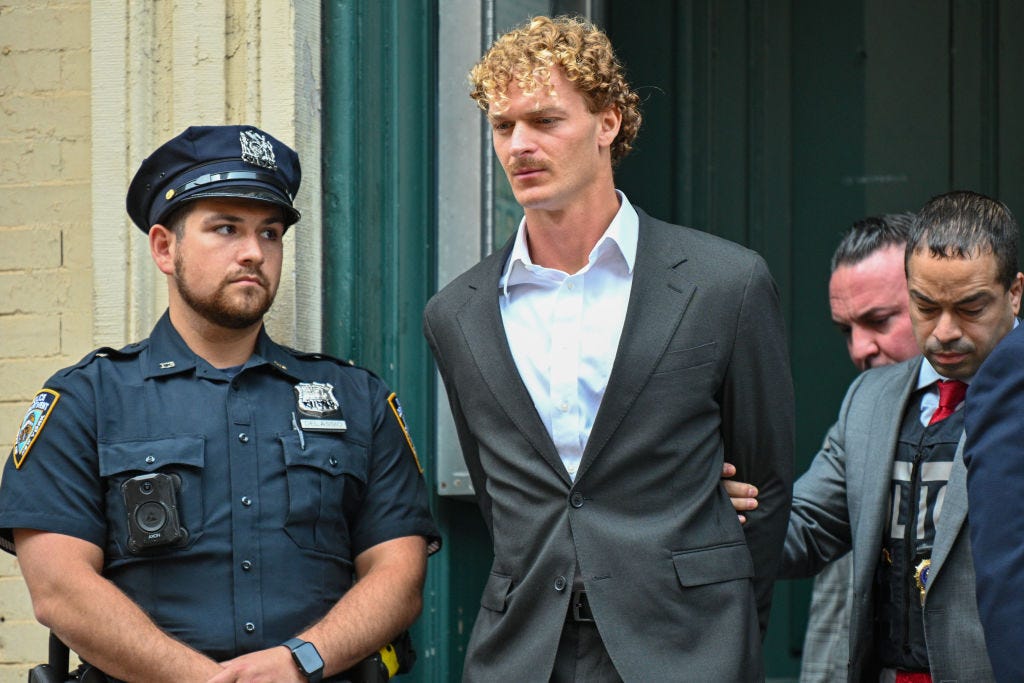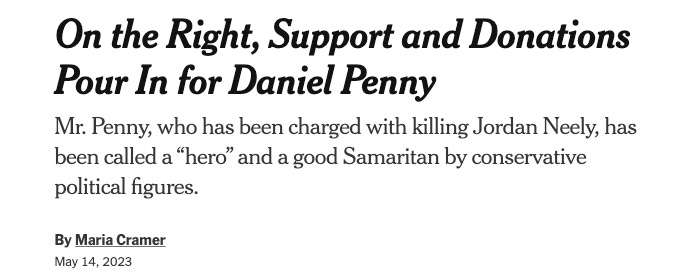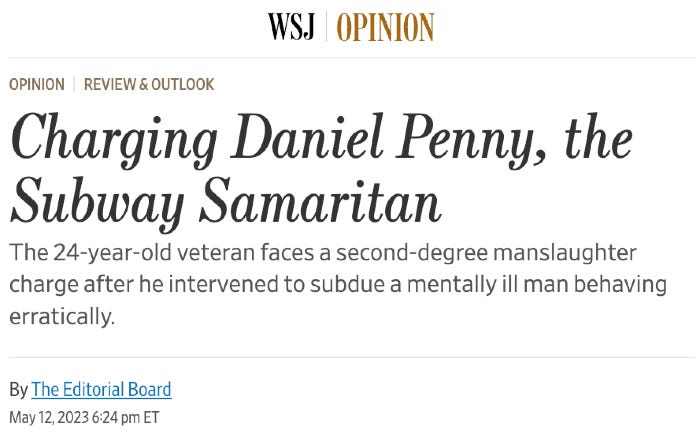I Think You're Confusing 'The Good Samaritan' With The Punisher
Right-wing media's bloodlust is getting a lot more overt these days. That's probably not great.
Hello, readers. Parker here.
Today’s newsletter is about Daniel Penny, Jordan Neely, the “good Samaritan” parable, and a dangerous right-wing culture of violence. It’s a lengthy one, so let’s jump right in.
“And who is my neighbor?”
The story of the good Samaritan is a passage from the Bible that you're likely familiar with, regardless of your level of religiosity. In the Gospel of Luke, Jesus narrates a parable about the importance of helping those in need. This was in response to a man who, seeking an understanding of what it means to "love your neighbor as yourself," asked, "And who is my neighbor?"
30 In reply Jesus said: “A man was going down from Jerusalem to Jericho, when he was attacked by robbers. They stripped him of his clothes, beat him and went away, leaving him half dead. 31 A priest happened to be going down the same road, and when he saw the man, he passed by on the other side. 32 So too, a Levite, when he came to the place and saw him, passed by on the other side. 33 But a Samaritan, as he traveled, came where the man was; and when he saw him, he took pity on him. 34 He went to him and bandaged his wounds, pouring on oil and wine. Then he put the man on his own donkey, brought him to an inn and took care of him. 35 The next day he took out two denarii[c] and gave them to the innkeeper. ‘Look after him,’ he said, ‘and when I return, I will reimburse you for any extra expense you may have.’
36 “Which of these three do you think was a neighbor to the man who fell into the hands of robbers?”
37 The expert in the law replied, “The one who had mercy on him.”
Jesus told him, “Go and do likewise.”
The meaning of the parable is unequivocal: we should assist others in their time of need, recognizing them as our neighbors despite any disparities in life experiences, ideologies, religions, or wealth. The good Samaritan encounters a desperate, dying man and aids in his recovery, simply because it is the right thing to do.
At least I thought the meaning was clear.
Jordan Neely was your neighbor
First, the facts:
Jordan Neely, 30, boarded a northbound F train at approximately 2:00 p.m. on May 1. According to the New York Times, Juan Alberto Vasquez, the journalist whose video of the altercation went viral, recounted that Neely “began screaming, causing people who were sitting near him to move away.” Neely “said he was hungry and thirsty and took off his jacket, throwing it down on the ground.” At one point, Neely said, “I’m tired already. I don’t care if I go to jail and get locked up. I’m ready to die.”
Daniel Penny, 24, put Neely in a chokehold, holding him there for “about 15 minutes,” according to Vasquez and police (via NBC News). Neely lost consciousness and was pronounced dead at Lenox Health Hospital. The New York City Office of Chief Medical Examiner determined that the cause of Neely’s death was “compression of the neck” (via CBS News), with officials labeling it a homicide.
On Friday, Penny was charged with second-degree manslaughter in Neely’s death. If convicted, he could spend up to 15 years in prison (via NPR). There’s no evidence that Neely physically assaulted anyone on board the train that day, just that he was loud and acting erratically.1

Daniel Penny, good Samaritan? I don’t think so.
On Friday, the Wall Street Journal's Editorial Board published a defense of Penny, calling him “the Subway Samaritan.”2
From that editorial:
Decades ago the U.S. made a decision to end the institutionalization of all but the most dangerous mentally ill, but too many of them now wander the streets and occasionally turn violent. Several have pushed unsuspecting passengers onto the subway tracks to their deaths, in stories New Yorkers know too well.
Was Mr. Penny wrong to intervene? The details of what happened will presumably be presented at trial, but it’s clear his intention wasn’t to kill Neely. It was to protect himself and others. As a 24-year-old veteran, he may have felt a particular responsibility to do so. We sometimes call such men good samaritans when they intervene to stop a shooter or step between a young woman and a harasser.
I’ve long come to expect the WSJ to churn out some truly vile opinion pieces, but the paper wasn’t alone in framing Penny as a good Samaritan.
Florida governor and aspiring dictator Ron DeSantis tweeted a link to Penny’s legal defense fund, accompanied by the text, “We must defeat the Soros-Funded DAs, stop the Left’s pro-criminal agenda, and take back the streets for law abiding citizens. We stand with Good Samaritans like Daniel Penny. Let’s show this Marine… America’s got his back.”
Scumbag Congressman Matt Gaetz called Penny a “HERO” and the “Subway Superman,” and right-wing activist Charlie Kirk called Penny’s indictment an “unjust prosecution.”
As of 1:20 p.m. EDT on May 15, Penny has raised more than $2.1 million through his GiveSendGo link.
Conservative New York Times columnist David French used Neely’s death and Penny’s arrest to argue that New York City isn’t tough enough on crime (the current mayor is a “tough on crime” former cop). A few excerpts:
On Friday, 11 days after Neely’s death, prosecutors charged Penny with second-degree manslaughter. To prove the charge, they will have to demonstrate beyond a reasonable doubt that Penny “recklessly” caused Neely’s death. Under New York State law, a person is deemed to act recklessly when he “engages in conduct which creates or contributes to a substantial and unjustifiable risk that another person’s death will occur.”
The key word in that definition is “unjustifiable.” That’s because New York State law provides a defense of justification, which permits a person to use physical force on another person when it is “necessary to defend himself, herself or a third person from what he or she reasonably believes to be the use or imminent use of unlawful physical force by such other person.”
And:
Neely should not have been in that subway car; he should have still been in the treatment facility or in jail. But he was on the subway, and his conduct was deeply disturbing. While reports are still incomplete, Neely was reportedly aggressive and menacing toward his fellow passengers. A witness stated that he was yelling, “I don’t have food. I don’t have a drink. I’m fed up.” He also reportedly said: “I don’t mind going to jail and getting life in prison. I’m ready to die.”
And most confusingly:
What if Penny had done nothing? Would everyone — including Neely — have emerged from that subway car unscathed? We can’t know for certain, and that lack of certainty creates the conditions for violence.
Would everyone “have emerged from that subway car unscathed” had Penny not put Neely into a chokehold until the life drained from his body? Yeah, probably! How casually some have justified the killing of a man should astound us, but I find myself feeling numb to the hypocrisies (the “tough on crime” people defending the killing of a man who didn’t commit a crime that day) and banality (naturally, the right pushed to defend and laud Penny) of it all.

They’re confusing the good Samaritan with the Punisher.
You know the Punisher, right? Frank Castle? The Marvel Comics vigilante with the skull on his chest? Or… sigh… the guy with the logo that a worrying number of police officers seem to be sporting these days? I’d say that’s a more fitting comparison for Penny3 than calling him a good Samaritan. Plus, it'd make the response to his actions a bit more coherent.
Following Neely's death, I observed a division among conservatives into two factions. The first faction defended Penny's actions, rationalizing what they portrayed as an unfortunate result—for instance, suggesting that this was merely an accident, and Penny was unaware that his chokehold could lead to Neely's death. I believe David French belongs to this category. The second, and arguably more alarming group, not only defends Penny but also glorifies him. This includes figures such as DeSantis, Gaetz, Kirk, and the WSJ Editorial Board, along with the New York Post crowd.
This group has always existed but seems to be increasingly emboldened. George Zimmerman got this treatment. Kyle Rittenhouse got this treatment. Daniel Perry got this treatment.
The people who assert their right to march through public spaces heavily armed, citing the Second Amendment as their justification,4 are often the same ones who claim that feeling uncomfortable, inconvenienced, anxious, or threatened grants them the right to terminate a life immediately. How often have we heard the justification of a police shooting with the phrase, "But the officer thought the man had a gun!"? This presents an inconsistent and incoherent worldview. These individuals defend lethal violence against marginalized groups—people of color, aggressive protesters, the unhoused, those with mental illnesses, LGBTQ individuals, religious minorities, etc.—while simultaneously maintaining that they possess a divine right to patrol the streets armed with enough ammunition to wreak havoc in an El Paso Walmart.
As a composer named Frank Wilhoit5 once wrote:
Conservatism consists of exactly one proposition, to wit:
There must be in-groups whom the law protectes but does not bind, alongside out-groups whom the law binds but does not protect.
There is nothing more or else to it, and there never has been, in any place or time.
For what seems to be a large chunk of the country, that’s definitely true. They haven’t always been as brazen about it as they are today, however. Some will just openly admit that’s their goal. For instance, earlier this year, during an interview with Glenn Beck, DeSantis said the following (emphasis mine):
We’re creating a model for what a free society should be. Yes: freedom for you to not be constrained by government — all conservatives have always believed that — but also, freedom for you to live your life without having the pathologies of the Left imposed upon you from all the other institutions in society.
This is precisely what DeSantis has done during his time as Florida’s governor. He’s implemented wildly anti-freedom policies that micromanage the lives of Floridians while claiming, falsely, that he is all about “freedom.” It’s depressing stuff.
Yes, I’m fully aware that “good Samaritan” is a term loosely used to describe a person who helps strangers. My argument is that it doesn’t apply here.
And comparing him to the Punisher isn’t necessarily a condemnation. Frank Castle is a total anti-hero who does the things he does because he believes his actions are justified. That’s literally what Penny did in this case.
SCOTUS kind of invented this… and recently, too. See: DC vs. Heller
The quote has been falsely attributed to political scientist Frank Wilhoit, but, fascinatingly enough, was actually coined by a composer of the same name. There’s a really interesting Slate piece about this that includes an interview with Wilhoit (composer).






It's so twisted to characterize "I don't have food. I don't have a drink" as menacing. Also, it's mind shattering and soul crushing to read someone positing hypotheticals about whether others and Neely might or might not have made it out unscathed when the fact of the matter is Neely didn't make it out unscathed.
The WSJ question was, "Was Penny right to intervene?" Actually, my answer to that is yes. Intervening is fine. It's appropriate. My complaint is not that he intervened. There are lots of behaviors that can be described as "intervening". You could step up to Neely, face to face and engage him in conversation, making yourself the focus of him. Draw him out, talk to him ... this will make him less likely to act out, not more.
AND, I think Penny was unequivocally wrong to hold Neely in a chokehold for 15 minutes. That's way past any mandate. As I've said before, the question in my mind was whether Penny was negligent or reckless. Prosecutors have gone with "reckless". They may have more information than I have. They may think they will get information in discovery. They may be feeling pressure and expect to plea bargain back to something else.